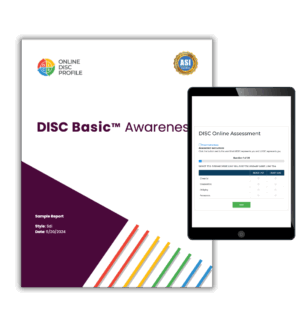How DISC Can Help Teach Emotional Intelligence (EQ)
Adam Stamm
Managing Partner: Online DISC Profile

Behavior, personality, and emotions are often discussed in separate conversations and taught in different programs. However, the relationship between these aspects of our identity is much closer than we give credit.
DISC assessments measure aspects of our personality through how we behave and communicate. On the other hand, emotional intelligence Assessments measure emotional intelligence.
While both assessments and topics are significant, we have found that you can cover both issues through a single assessment: DISC.
We have offered DISC assessments since 1986 and found that DISC can help teach aspects of emotional intelligence by assisting learners to discover and learn:
- Self-awareness
- Motivations and Stress
- Social skills
- Self-regulation
In this article, we will review how you can leverage DISC also to help teach emotional intelligence. I won’t cover the foundations of DISC, and I want to encourage you to read more about how DISC works by reading this article first. Once you understand the model, you can take a free DISC assessment to learn your style. You can purchase the full DISC assessment to learn more about yourself.
If you already know DISC, keep reading! Below is what I will cover in this article.
What is the difference between DISC and EIQ?
Emotional Intelligence is the ability to recognize emotions (either your own or another person’s) and to choose how to respond. It is also known as EI, EQ, or EIQ (we will refer to it as EIQ moving forward). EIQ Assessments measure our awareness and regulation of ourselves and how others make us feel.
Alternatively, DISC measures two dimensions of our personality and focuses on understanding how we behave in social and emotional situations. It measures our motivations and identifies the stressors that cause us to act in specific and predictable manners.

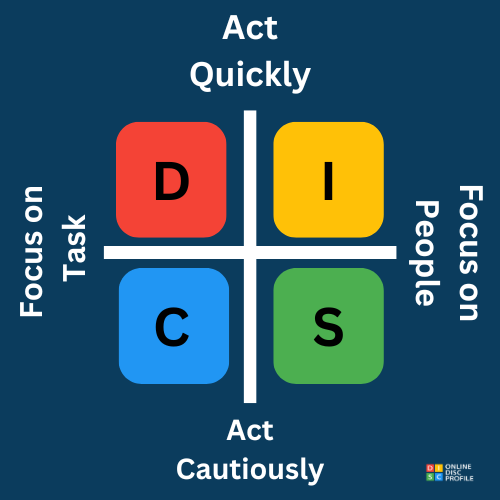
Both types of assessments are essential and offer unique insights.
- EIQ Profile Benchmarks EIQ
- DISC Measures Personality and why emotional responses might occur.
The EIQ profile provides a benchmark for where a person might struggle emotionally and allows for nuanced conversations about improving in specific areas. It measures a snapshot of how we behave and interact emotionally. The goal is to understand how to improve in areas where we fall short during emotional regulation.
Conversely, DISC measures a core part of our personality that is fairly stable throughout our lives. In addition, it offers a lens through which we can identify the personalities of others. Taken together, we can better understand the dynamics of our relationships.
Both assessment products have been validated and are designed for use in a personal and professional development setting. They can also be used in a hiring process. The ultimate difference is that the EIQ Profile benchmarks a person’s emotional intelligence. In contrast, DISC can indicate areas that might cause stress (and, therefore, potentially poor emotional responses).
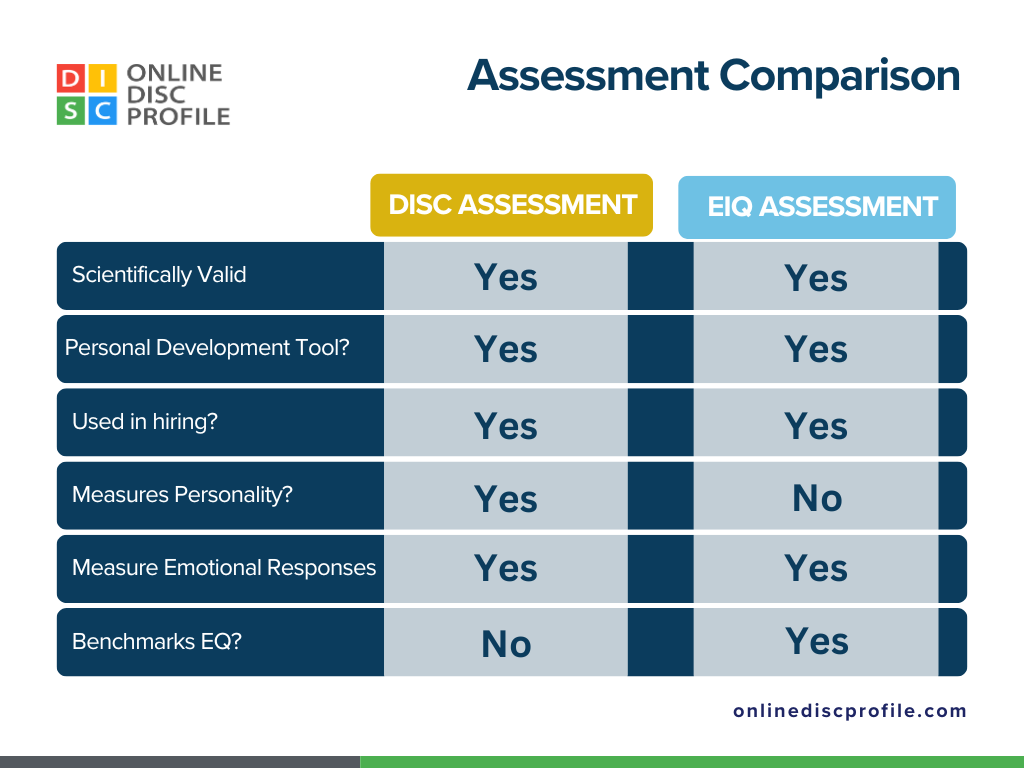
Is there a Scale for Emotional Intelligence?
Unlike DISC, emotional intelligence doesn’t have scales or dimensions.
The reason is that emotional intelligence measures the range of how you respond to emotional and social situations. Conversely, DISC measures the scale or dimension that most accurately describes your personality – this is unlikely to change much over time, unlike emotional intelligence, which you are trying to change and improve.
Emotional Intelligence measures a person within four areas:
- Self-awareness
- Self-management
- Social-awareness
- Social-management
You will receive a percentage score based on how you answer assessment items for each section.
Why Emotional Intelligence Matters
One key difference between DISC and EIQ Assessments is the variance in the measurements. Anyone can improve their emotional intelligence if they spend the time and effort working on it. This is why emotional intelligence is so important – because it can and should change!
Emotional Intelligence can change, unlike your personality or IQ. Research has found that your emotional responses have more to do with future success, relationships, or how much money you make than your IQ or personality.
EIQ assessments, then, can provide insights into how you can regulate your emotions and help you gain more control over your responses to external stressors.
Developing Emotional Intelligence with DISC
I’ve stated previously that DISC doesn’t measure emotional intelligence. However, improved emotional intelligence is a by-product of learning and implementing DISC.
When a team or a person is just starting to use DISC, we refer to a rule that might seem familiar but is unique to DISC. This rule is called the Platinum Rule. You may have heard of a similar-sounding rule called the Golden Rule. These rules are different:
- The Golden Rule states: “Do unto others as you have them do unto you.”
- The Platinum Rule states: “Treat others as they wish to be treated.”
The Platinum Rule demands that I consider the communication preferences of others. This rule is more empathetic. It asks you to consider the needs of others from the context of what you know about yourself.
Additionally, this concept grounds a person in self-awareness, social awareness, and social regulation, which are all part of what Emotional Intelligence teaches. If you have started benchmarking yourself or your organization’s emotional intelligence with an EIQ Assessment, DISC will provide more context around emotional regulation and approaches.
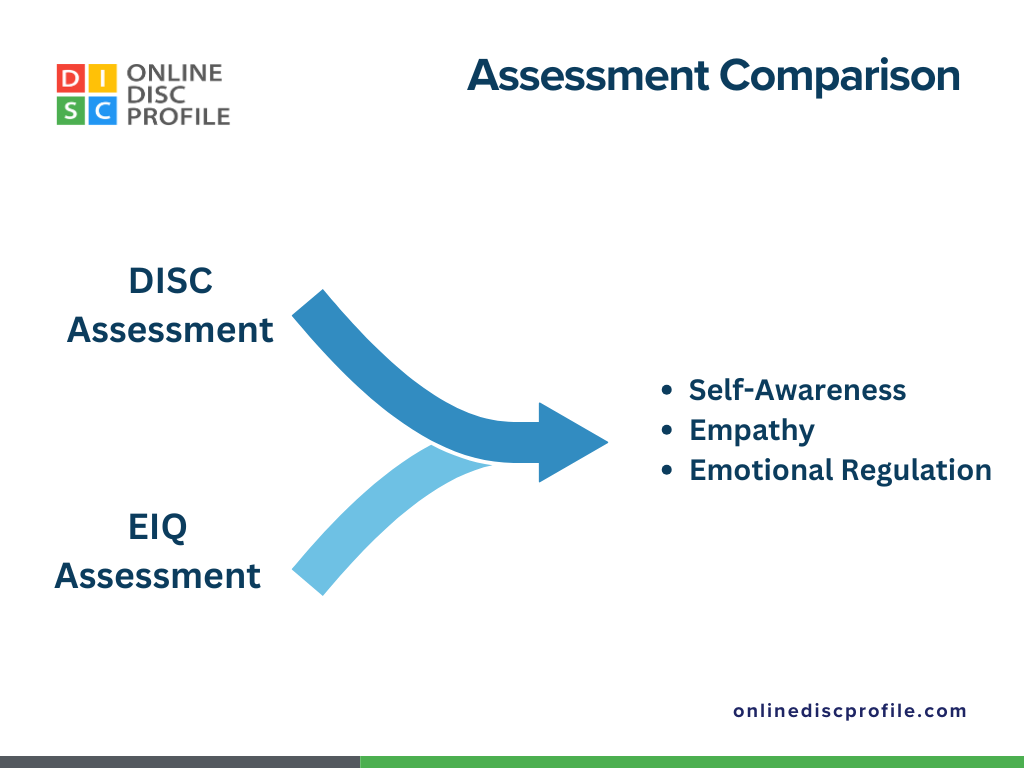
It’s important to state that DISC Assessments can’t wholly replace what EIQ Assessments offer because DISC doesn’t benchmark a person’s EIQ Scores. We have found that DISC supports and enhances the work being done during an EIQ Training or Coaching session.
DISC Method, Mental Health, and Emotional Intelligence Types
The DISC method measures workplace stress. For this reason, it’s important to note how DISC could go beyond helping improve emotional intelligence by assisting people to understand what might be straining their mental health.
For example, individuals with a strong C Personality Type prefer to work in an environment where they can produce work with a high degree of accuracy. If they are asked to work quickly and push projects out, they don’t feel it meets their satisfaction, and their mental health could suffer over time.
Within Emotional Intelligence, this person could go deeper by understanding which emotional intelligence type they need to work on. There are four emotional intelligence types:
- Self-awareness
- Self-regulation
- Social-awareness
- Social-regulation
Using our example from above, the high C Personality person might be OK with simply recognizing that their stress is due to a high need for accuracy. They can work on their mental health by letting go of that need if they understand why they need to produce their projects faster due to external circumstances.
By combining DISC and and understanding of each emotional intelligence type, learners can improve their mental health.
DISC, EIQ, and the idea of "Stretch"
DISC teaches a process of learning how to choose a behavior based on the needs of others. This is the core concept of the Platinum Rule.
To understand how this works, imagine two different behaviors on a continuum. On one end is the behavior and identity of being a good problem solver; on the other is the behavior and identity of being a Good Listener.
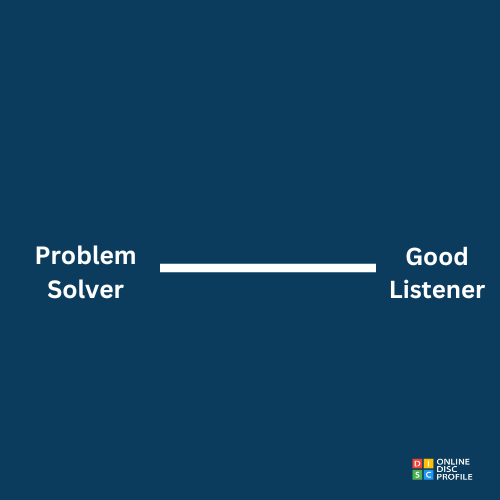
Both of these behaviors are fine qualities, but they are different and can be opposing behaviors.
For example, you may find that people who are good problem solvers aren’t always the best listeners. To solve problems, they may want to move quickly to test assumptions and see what could work to solve an issue. On the other hand, a good listener will take more time to consider what is being said, ask more questions, and try to understand the core problem without feeling a strong urge to solve the problem.
Example: A Person with a D-Style
DISC teaches that it’s essential to consider the most appropriate behavior regardless of what may come naturally to you.
This is the concept of ‘stretch’.
Here’s another example: if a person who responds on a DISC Basic assessment indicates that they are both fast-paced and very skeptical, they would fall under the D-Personality Type.
They are:
- Direct
- Quick to Take Action
- Face Challenges head-on
This is how they normally describe their behavior.
How would this person behave if they discovered that a close friend or relative lost their job?
Potentially, they might continue to exhibit their D-style behaviors. They could view the situation as another challenge for them to overcome on behalf of their friend.
They may act and determine their friend’s immediate next steps to return to work. They may even start a search to find potential jobs, or they might take their friend’s resume and see if there are open positions at their place of work.
On the other hand, they might need to stretch from their normal action-oriented behaviors and provide supportive behaviors that are more aligned with the I Personality Type and the S Personality Type. Using the Platinum Rule, they would need to consider the needs of their friend first before doing anything.
This idea of “stretch” is unique to the DISC model but leans heavily on Emotional Intelligence training.
When the individual in our example stretches to choose a behavior on the other side of the DISC map, they might take time to really listen to their friend or relative. They might be more accommodating or comfort the person by taking them out to eat, sending them a card, or any small gesture to let the person know that they are there for them.
The idea of stretch (in regards to behavior) aligns well with EIQ training.
EIQ assessments measure how well we manage our emotions in four areas:
- Self-Awareness
- Self-Management
- Social-Awareness
- Social-Management
With Emotional Intelligence assessments like the EIQ assessment, a person can see how they score against these specific areas.
Pairing EQ assessments with DISC enhances the stretch idea that we just discussed.
For example, a person could have reasonably high emotional awareness when recognizing their feelings and how they make others feel.
However, recognition is only half of the equation. Their EIQ scores can also identify how easy or hard it is to manage their emotional responses.
Thinking back to our D-Personality Type example from above, this individual might recognize that their behavior can be overbearing, but they might not be able to manage it (yet!). This is where working with a DISC Certified coach can help as well, but it’s entirely possible for anyone to use these tools and work on their EIQ on their own.
Summary (TLDR)
We covered a lot in this article. Here are the cliff notes:
- DISC can help people improve their emotional intelligence, but DISC doesn’t measure emotional intelligence like an EIQ Assessment.
- DISC Concepts lean on emotional intelligence concepts to teach self-awareness and social and emotional regulations.
- DISC and EIQ Assessments are both validated and researched models that can help personal and professional development.
How to Get started with DISC + EIQ
We help thousands of individuals learn more about themselves every month, and we work with hundreds of organizations around the globe. If you are looking for a tool that combines both DISC and EIQ insights into a single report, we now offer a report called the DISC Awareness Assessment.
If you are have questions about how to get started in using DISC, EIQ, or another product, please fill out the form below to reach out to our sales team.
"*" indicates required fields
